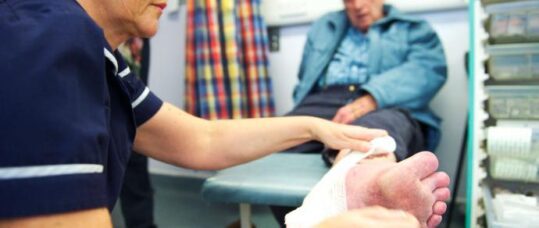Using ‘right language’ with male patients can make a difference, says report

Making sure to use certain phrases with men during consultations can make a difference to uptake of interventions, according to a new report.
The document, published by the Queen’s Nursing Institute (QNI), and which features guidance for practice and community nurses when working with male patients, states that referring to ‘health eating’ as opposed to ‘dieting’, and ‘fitness’ instead of ‘weight loss’, can help break down barriers improve compliance with interventions for obesity.
It also advises primary care to ‘capitalise’ on transition points within men’s lives, such as becoming a father or retirement, as they may be ‘more receptive to health messages’.
Practice nurses are also advised to target at-risk groups of male patients and develop new, targeted services for these patients. This includes the homeless, refugees and low income male patients, but could also be those who already have risk factors on their medical record but are infrequent users of GP services.
The guidelines were derived from the work of nine projects, supported by the QNI, that looked into improving various aspects of the health and wellbeing of male patients.
The projects each looked to improve a variety of outcomes, from uptake of NHS Health Checks, to improving management of those with mental health issues.
Related Article: Nurses must be ‘recognised and rewarded’ to say in profession, says Streeting
Key findings from these projects include:
- Men who avoid NHS Health Checks do so due to fear of blood tests, blood pressure checks and finding a problem with their health.
- Men, including the student population, prefer facts and evidence to help convince them of the need for intervention. Heart age was found to be useful to convince men to comply with weight management programmes.
- A one-to-one approach was preferred by male patients for support with health and lifestyle changes over local weight management services, as it was felt the latter were primarily aimed at women.
- A survey of male students about their approach to sexual health issues found that they were more likely to access a drop-in clinic rather than use a self-screening kit, although this was not reflected during the project itself, where nobody attended a drop-in clinical despite marketing efforts.
RCN deputy director of nursing Steph Aiken said that the report demonstrated the value of targeting lesser known groups of patients.
She said: ‘This report shows the importance of targeting seldom heard groups and tailoring specialist care to meet the different needs in our society.
‘But if community nurses are to continue playing a pivotal role in delivering care closer to home then funding to provide community services must be able to adapt to growing demand.’
|
The guidelines in full 1. Learn more about men’s health and how to work with 2. Be aware of male gender role norms when developing 3. Sharing positive stories about other men’s experience and using the ‘right’ language can also make a difference. Refer to ‘healthy eating’ rather than ‘dieting’, for example, ‘fitness’ rather than ‘weight loss’ or ‘stress’ rather than ‘mental health’. 4. ‘Make every contact count’, especially with men who Related Article: Investigations into whistleblowing at NMC delayed and recommissioned 5. Capitalise on key transition points in men’s lives when they may be more receptive to health messages. 6. Identify groups of men at particular risk (e.g. men 7. Promote NHS Health Checks, particularly to those 8. Go to ‘where men are’ (e.g. workplaces, sports clubs, 9. Set up men-only groups. Many men prefer to work in 10. Ensure that general health clinics are ‘male-friendly’ with male-interest magazines in the waiting room, men’s health posters and leaflets on display, and Related Article: One in five appointments in general practice completed by a nurse 11. Organise local health promotion activities linked to 12. Record, evaluate and disseminate interventions with |

See how our symptom tool can help you make better sense of patient presentations
Click here to search a symptom


Making sure to use certain phrases with men during consultations can make a difference to uptake of interventions, according to a new report.



